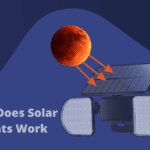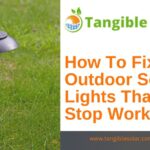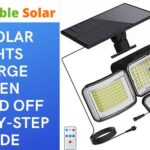How long do outdoor solar lights last? Discover the power of solar energy!
Outdoor solar lights typically last between 5 and 10 years, depending on the quality of the product and how well they are maintained. Solar panels that convert sunlight into energy and store it in a rechargeable battery power these lights.
As the sun sets, the lights automatically turn on, providing illumination for the surrounding area. In addition to being eco-friendly and cost-effective, outdoor solar lights are also low-maintenance, with no wiring or electricity required. With proper care and regular cleaning of the solar panels, they can provide reliable outdoor lighting for many years.
Understanding The Lifespan Of Outdoor Solar Lights
Understanding the Lifespan of Outdoor Solar Lights Understanding their lifespan is crucial for making informed decisions about purchases and maintenance. Solar lights bring energy efficiency and sustainability to outdoor lighting solutions, but how long do they last? In this article, we will delve into the factors that affect the lifespan of outdoor solar lights, including the role of battery capacity and quality, the impact of solar panel efficiency, and how weather conditions can also play a part.
Factors Affecting The Lifespan Of Outdoor Solar Lights
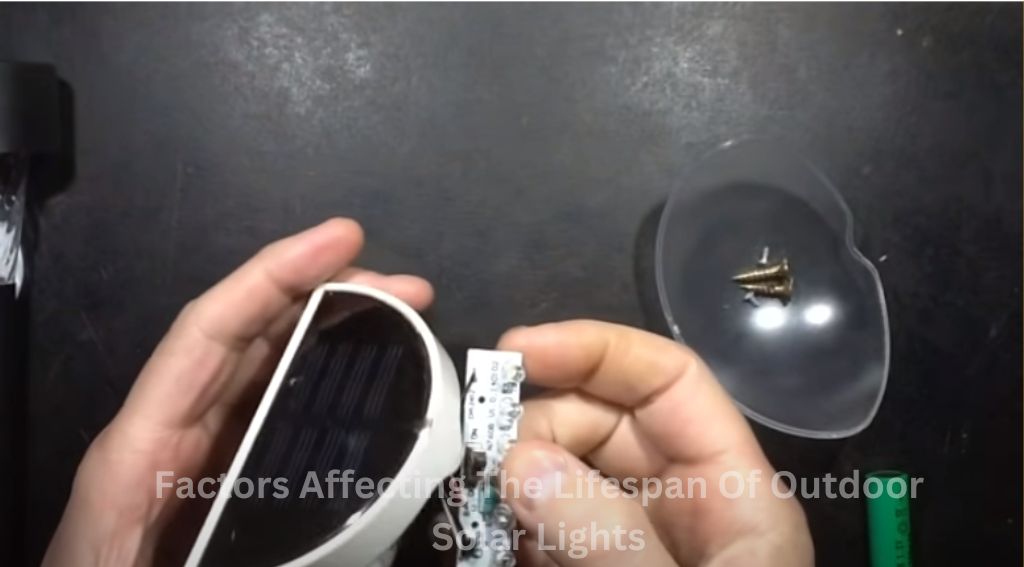
Numerous factors can affect the lifespan of outdoor solar lights. Understanding these factors can help you optimize their longevity and efficiency. Here are some key factors to consider:
1. Battery capacity and quality: The battery is a crucial component of outdoor solar lights, as it stores and supplies power during low-light periods. Choosing solar lights with a higher battery capacity ensures a longer duration of illumination. Additionally, investing in high-quality batteries can prevent premature failure and extend the overall lifespan of the lights.
2. Solar panel efficiency: The efficiency of the solar panel directly impacts the charging capability and performance. Higher-efficiency solar panels can convert more sunlight into usable energy, leading to faster charging and extended operational times. Opting for solar lights with efficient panels can contribute to their longevity.
3. Weather conditions: Harsh weather conditions can have a significant impact on the lifespan of. Extreme temperatures, heavy rain, and exposure to direct sunlight for prolonged periods can deteriorate the materials and components of solar lights. Regularly checking and cleaning the solar panels and protecting the lights from adverse weather conditions can help prolong their lifespan.
The Role Of Battery Capacity And Quality
The battery capacity and quality are essential factors to consider when determining their lifespan. Having a larger battery capacity means the lights can store more energy, which translates into a longer illumination duration. Investing in quality batteries ensures that they can withstand frequent charging and discharging cycles without losing their capacity. It is advisable to choose solar lights with reputable battery brands to maximize their lifespan and overall performance.
Impact Of Solar Panel Efficiency On Longevity
The efficiency of solar panels in outdoor solar lights is a crucial element that determines their longevity. Solar panels with higher efficiency can collect and convert more sunlight into usable energy, ensuring optimal charging of the lights’ batteries. This not only enhances their performance but also increases their overall lifespan. Opting for solar lights equipped with efficient solar panels is therefore a wise choice to extend their longevity and maintain consistent illumination.
How Weather Conditions Can Affect The Lifespan
Weather conditions can significantly impact the lifespan of outdoor solar lights. Extreme temperatures, such as excessive heat or cold, can degrade the materials and components of the lights, leading to potential failure. Heavy rain and humidity can corrode the electronic parts, reducing their functionality over time. Excessive exposure to direct sunlight can also cause deterioration. To ensure a longer lifespan, it is important to regularly inspect and clean solar panels, protect the lights from harsh weather conditions, and make any necessary repairs or replacements as needed.
How Many Solar Panels to Run Grow Light
In conclusion, understanding the lifespan of outdoor solar lights is vital for making informed choices and optimizing their efficiency. Factors such as battery capacity and quality, solar panel efficiency, and weather conditions all play a role in determining how long these lights will last. By considering these factors and implementing proper maintenance practices, you can ensure that your outdoor solar lights will illuminate your space for years to come.
Benefits Of Investing In Outdoor Solar Lights
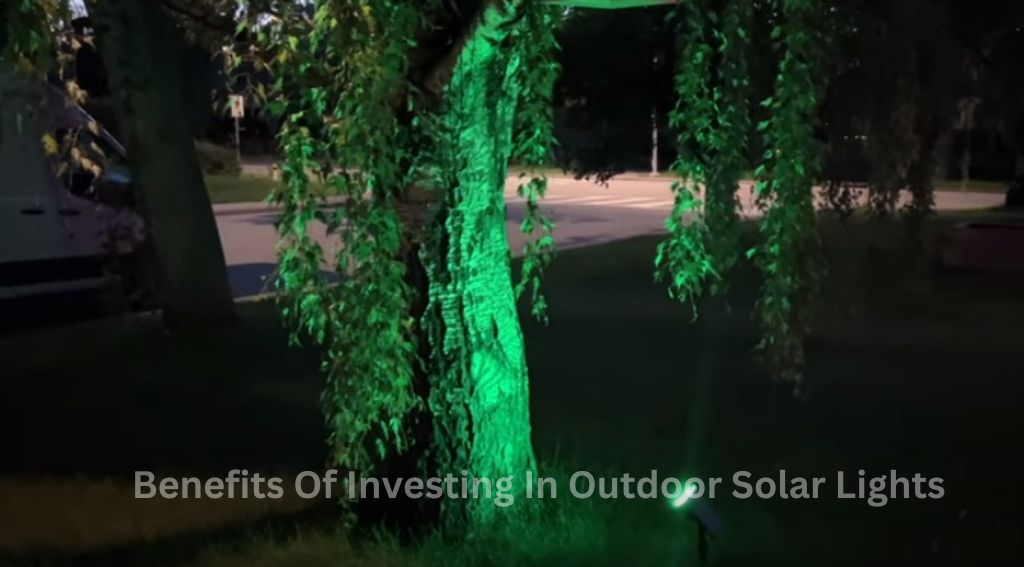
Outdoor solar lights are a smart investment for any outdoor space. Not only do they provide illumination during the night, but they also offer numerous benefits that make them a popular choice among homeowners and businesses alike. From cost savings and energy efficiency to environmental friendliness and ease of installation, outdoor solar lights have it all. Let’s explore each of these advantages in detail:
Cost Savings And Energy Efficiency
One of their significant advantages is the cost savings they bring. By harnessing the power of the sun, solar lights eliminate the need for electricity, which can lead to substantial savings on your utility bills. Traditional outdoor lighting can consume a significant amount of energy, contributing to higher electricity costs. With solar lights, you’ll experience long-term savings, as they use renewable energy to operate.
Additionally, outdoor solar lights are highly energy-efficient. The built-in photovoltaic panels absorb sunlight during the day, converting it into electricity and storing it in rechargeable batteries. This stored energy is then used to power the lights at night. utilize this energy-saving mechanism, allowing for reliable and sustainable outdoor lighting without compromising on brightness or performance.
Environmentally Friendly Lighting Solution
Solar lights are an environmentally friendly lighting solution that reduces your carbon footprint. Unlike traditional lighting systems that rely on electricity generated from fossil fuels, solar lights are powered by clean and renewable energy from the sun. By using solar lights, you contribute to the reduction of greenhouse gas emissions and the preservation of our planet.
Furthermore, they don’t produce harmful emissions or byproducts, making them safe for the environment and human health. They don’t require any wiring, which also reduces the need for additional materials and resources, minimizing waste.
Ease Of Installation And Maintenance
Installing outdoor solar lights is incredibly easy and hassle-free. Solar lights, in contrast to conventional wired lights, are installable by anyone, regardless of technical proficiency. They are designed to be user-friendly, with most models offering simple DIY installation.
Best Solar Powered Pool Lights Reviews
Solar lights also eliminate the need for ongoing maintenance. Once installed, they require minimal upkeep. The photovoltaic panels are self-cleaning, and the batteries are typically long-lasting. With no bulbs to replace or wires to maintain, maintaining outdoor solar lights is a breeze. This not only saves you time and effort but also reduces the overall cost of ownership.
Enhancing Outdoor Aesthetics
In addition to the practical benefits, outdoor solar lights can enhance the aesthetic appeal of your outdoor space. These lights come in a variety of designs, shapes, and sizes, allowing you to choose the ones that complement your outdoor decor. Whether you’re looking for sleek and modern lights or vintage-style lanterns, solar lights offer a wide range of options to suit your taste.
Moreover, solar lights can be strategically placed along pathways, driveways, gardens, or around outdoor structures to create a captivating ambiance. With their soft and warm glow, these lights add a touch of elegance and charm to any outdoor setting, making your space visually appealing and inviting.
Investing is a decision that brings numerous benefits to both your wallet and the environment. From cost savings and energy efficiency to ease of installation and maintenance, solar lights are a sustainable lighting solution that enhances the aesthetics of your outdoor space. So why wait? Make the switch and enjoy a brighter, greener future.
Extending The Lifespan Of Outdoor Solar Lights
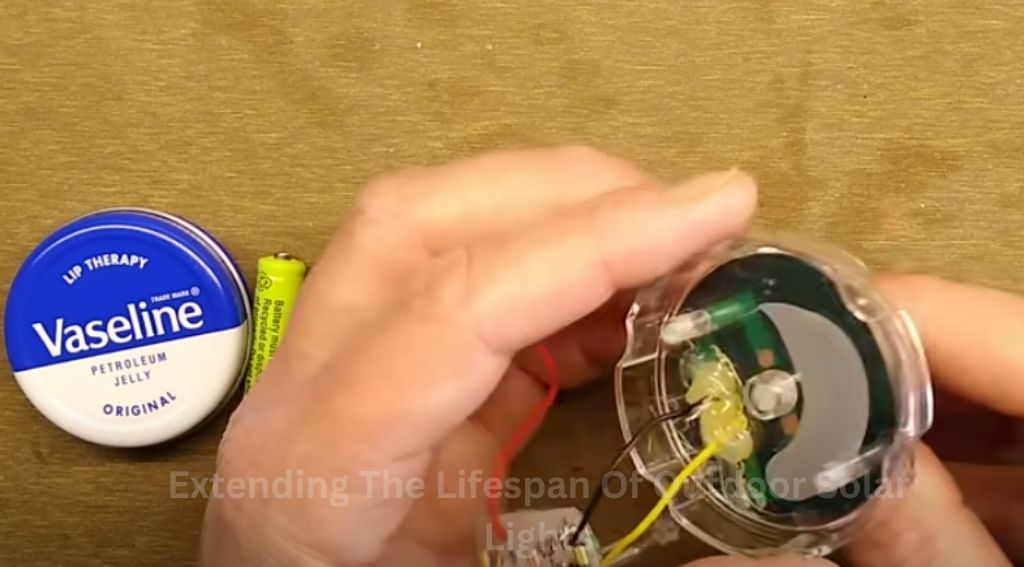
Proper Placement For Optimal Sun Exposure
One of the key factors in extending the lifespan of outdoor solar lights is proper placement to ensure optimal sun exposure. When installing your solar lights, it’s important to consider the position and angle that will allow the solar panels to receive maximum sunlight throughout the day.
- Place the lights in an open area where they can receive direct sunlight.
- Avoid placing them in shaded or obstructed areas.
- Angle the solar panels towards the south to capture the most sunlight during the day.
- Keep the solar panels clean and free from any debris or obstructions that might hinder sunlight absorption.
By placing your outdoor solar lights strategically, you can ensure that they receive the necessary sunlight to charge efficiently, thus prolonging their lifespan.
Regular Cleaning And Maintenance
Regular cleaning and maintenance play a crucial role in optimizing the lifespan of your outdoor solar lights. Here are some maintenance tips you should follow:
- Regularly clean the solar panels to remove any dust, dirt, or debris that can reduce their efficiency.
- Use a soft, damp cloth or sponge to gently wipe the panels, avoiding abrasive cleaners or materials that may scratch or damage them.
- Inspect the lights periodically for any signs of wear or damage, such as loose wires, cracked casing, or dimming illumination.
- Replace any faulty components immediately to prevent further damage.
By incorporating regular cleaning and maintenance into your outdoor solar light routine, you can ensure their efficiency and longevity.
Upgrading batteries Or Solar Panel Components
Another step you can take to extend the lifespan of your outdoor solar lights is to upgrade the battery or solar panel components. Over time, the battery may become less efficient at holding a charge, or the solar panels may lose some of their capacity to convert sunlight into energy.
If you notice a significant decrease in the illumination or the light no longer stays on throughout the night, it may be time to consider replacing the battery or upgrading the solar panel components. By investing in high-quality components with improved efficiency, you can extend the lifespan of your solar lights and ensure they continue to provide reliable illumination.
Protection Against Extreme Weather Conditions
Extreme weather conditions can have a detrimental effect on outdoor solar lights. Whether it’s scorching heat, heavy rain, or freezing temperatures, protecting your lights from the elements is crucial for their longevity.
Here are some measures you can take to safeguard your solar lights against extreme weather:
- Choose lights with durable and weather-resistant materials that can withstand different weather conditions.
- Place the lights safely to avoid having them blown over or damaged by strong winds.
- During the harsh winter months, consider removing the lights and storing them in a safe place until the weather improves.
By taking precautions and protecting your outdoor solar lights from extreme weather conditions, you can ensure they remain functional and reliable for years to come.
Common Issues And Troubleshooting Tips
When it comes to outdoor solar lights, knowing how long they last is important for maximizing their benefits. However, it is not uncommon to encounter certain issues that can affect their performance. In this section, we will discuss some common issues that you may come across and provide troubleshooting tips to help you resolve them. By understanding these issues and their solutions, you can ensure that your solar lights keep shining brightly.
Dimming Or Inconsistent Light Output
One common issue with outdoor solar lights is dimming or inconsistent light output. If your lights are not as bright as they used to be or the light output varies throughout the night, there are a few possible causes for this problem.
- Check if the solar panel is dirty or obstructed. Over time, solar panels can accumulate dust, dirt, or debris, which can reduce their efficiency in converting sunlight into electricity. Clean the solar panel gently using a soft cloth or brush, and ensure that it is exposed to direct sunlight without any obstructions.
- Inspect the batteries. Dimming lights can be an indication of weak or aging batteries. If your solar lights have replaceable batteries, consider replacing them with fresh ones. Ensure that the batteries are properly inserted and connected.
- Examine the position of the solar lights. Insufficient exposure to sunlight can lead to diminished performance. If your lights are installed in shaded areas or under overhanging trees or structures, consider relocating them to a spot with better sunlight exposure.
- Consider the weather conditions. Cloudy or rainy days can impact the charging capacity of solar lights. While solar lights are designed to function even in low-light conditions, prolonged periods of bad weather may affect their performance. Keep this in mind if you notice dimming lights after a few cloudy days.
Battery Not Charging Or Holding A Charge
If your outdoor solar lights seem to have difficulty charging or holding a charge, the following troubleshooting tips may help you identify and resolve the issue.
- Ensure that the solar panel is clean and free from any obstructions. A dirty or shaded solar panel can prevent the batteries from charging properly. Clean the panel as mentioned earlier and check if it is properly positioned to receive maximum sunlight.
- Check the connection between the solar panel and the battery. Make sure that the wires are securely connected and are not damaged. A loose or damaged connection can prevent the battery from charging effectively.
- Test the batteries using a battery tester or by connecting them to a different device. If the batteries are faulty or no longer hold a charge, they may need to be replaced.
Non-responsive Or Malfunctioning Solar Panel
If your solar panel is unresponsive or malfunctioning, preventing your lights from working properly, try these troubleshooting steps:
- Inspect the solar panel for any physical damage, such as cracks or corrosion. Physical damage can hinder the panel’s ability to generate electricity. If you find any damage, consider replacing the solar panel.
- Check the wiring connections between the solar panel and the lights. Ensure that the connections are secure and not damaged. A loose or damaged connection can affect the overall performance of the solar lights.
- Consider the location of the solar lights. Extreme temperatures, such as intense heat or cold, can impact the performance of the solar panel. If your lights are exposed to extreme weather conditions, consider relocating them to a more suitable area.
By addressing these common issues and following the troubleshooting tips provided, you can overcome various problems that may arise with your outdoor solar lights. Remember that proper maintenance, regular cleaning, and adequate sunlight exposure are key to maximizing the longevity and performance of your solar lights.
Exploring Advances In Solar Technology
In recent years, there have been remarkable advancements in solar technology, transforming the outdoor lighting industry. These advances not only enhance the performance and longevity of outdoor solar lights but also make them more efficient and user-friendly. In this article, we will delve into the latest developments that have revolutionized.
New Developments In Solar Panel Efficiency
Solar panel efficiency plays a crucial role in determining the overall performance and reliability of. With significant advancements in this area, solar panels have become more efficient than ever before. The newer models utilize cutting-edge photovoltaic cells that capture sunlight more effectively, converting it into usable energy for extended.
The latest solar panels also take advantage of enhanced materials and innovative designs to maximize energy conversion. For instance, some panels incorporate anti-reflective coatings to reduce energy loss due to reflection, thereby boosting overall efficiency. These improvements contribute to longer-lasting outdoor solar lights, providing bright illumination throughout the night, even in low-light conditions.
Emerging Battery Technologies For Improved Performance
One of the primary concerns with outdoor solar lights has always been the storage capacity and performance of the batteries. However, thanks to recent advancements in battery technology, these concerns are being addressed comprehensively. New types of batteries, such as lithium-ion, have emerged as game-changers in the solar industry.
Lithium-ion batteries offer several advantages, including a higher energy density, a longer lifespan, and faster charging capabilities. As a result, outdoor solar lights equipped with lithium-ion batteries can operate for extended periods, providing reliable illumination throughout the night. Furthermore, these batteries are more resistant to extreme temperatures, ensuring optimal performance even in harsh weather conditions.
Smart Features And Automation In Outdoor Solar Lights
The rise of smart technology has expanded its reach to outdoor solar lighting. Nowadays, they come with a variety of sophisticated features and automation options that make them more convenient and energy-efficient. These smart features allow for effortless customization and control over the lighting settings.
For instance, some outdoor solar lights now have motion sensors that activate the lights when someone approaches, conserving energy during idle periods. Additionally, timers and remote-control capabilities enable users to schedule the lights according to their preferences, enhancing convenience and security. These smart features are becoming an intelligent and eco-friendly choice for outdoor lighting solutions.
The Future Of Solar Energy And Its Impact On Outdoor Lighting
The future of solar energy looks promising, with ongoing advancements likely to have a profound impact on outdoor lighting. Innovations such as transparent solar panels and flexible solar cells are being explored, opening up possibilities for the seamless integration of solar technology into various outdoor lighting applications.
Moreover, as solar energy becomes more affordable and accessible, we can expect it to become a standard choice for homeowners and businesses alike. This transition will not only reduce dependence on conventional power sources but also contribute to a cleaner and more sustainable environment.
In conclusion, exploring advances in solar technology reveals a bright future. With improvements in solar panel efficiency, emerging battery technologies, smart features, and automation, outdoor solar lights are becoming more efficient, durable, and user-friendly. As solar energy continues to evolve, the impact on outdoor lighting is undeniable, paving the way for a greener and more innovative future.
Frequently Asked Questions On How Long Do Outdoor Solar Lights Last
Why do outdoor solar lights stop working?
may stop working due to various reasons, such as a drain, a faulty solar panel, damaged wiring, or obstruction of sunlight. Check the battery, clean the solar panel, inspect the wiring, and ensure the lights are exposed to direct sunlight for optimal performance.
How Many Hours Do Solar Outdoor Lights Last?
Solar outdoor lights can last up to 8–12 hours on a full charge, providing reliable illumination throughout the night. The exact duration varies depending on the light’s battery capacity, the sunlight exposure it receives, and the type of LED bulb used.
Do outdoor solar lights need batteries replaced?
Yes, outdoor solar lights may need their batteries replaced as they store solar energy to power the lights at night. However, the lifespan of the batteries can vary depending on usage and quality.
How long do outdoor solar lights last?
Outdoor solar lights typically have a lifespan of 2–3 years. This can vary depending on the quality of the lights and the amount of sunlight they receive. It’s important to note that over time, the batteries in solar lights may lose their ability to hold a charge, requiring replacement.
Regular cleaning and maintenance can also help extend their lifespan.
Conclusion
Outdoor solar lights are a wise investment, offering an environmentally friendly and energy-efficient lighting solution. The caliber of the materials used and the level of maintenance are two factors that affect their longevity. By choosing high-quality solar lights and taking proper care of them, you can expect them to last for several years, providing cost-effective illumination for your outdoor spaces.
When considering outdoor lighting options, solar lights are a durable and dependable choice.


